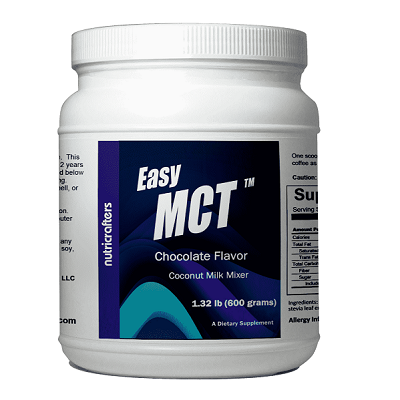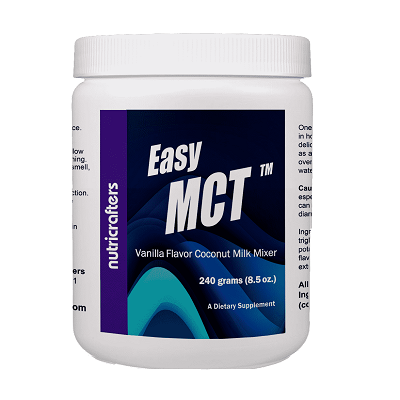How to choose the MCT that’s right for you.
There are many MCT product options available in the marketplace. While it is hard to make a bad choice in selecting MCT products, a new study shows a certain MCT oil is 3 times better than the second best choice.
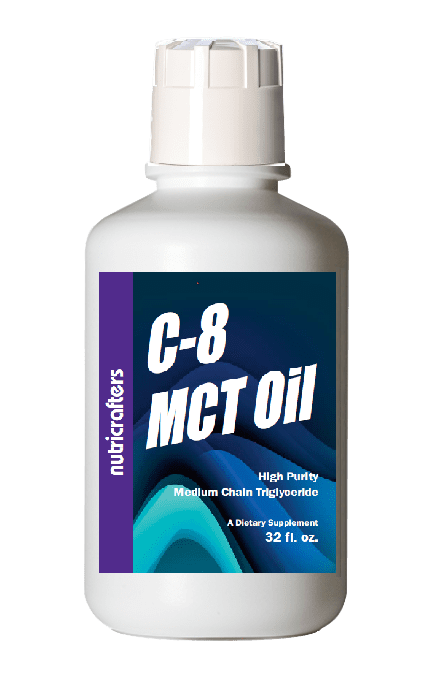
Medium Chain Triglycerides, also known as MCT oil or MCT’s, have many beneficial health promoting properties. The most interesting is that the body will not store MCT like most fats and oils. When MCT oil is consumed, it is rapidly converted to energy or excreted. Another exciting fact about MCT oils is they produce ketones – a source of cellular energy. Ketones produce energy very quickly – without relying on glucose. This is particularly significant when the supply of glucose is compromised due to insulin resistance, a common health concern.
MCT’s – A Truly Thin Fat
Fat molecules are made up of chains of carbon atoms. Long-chain fatty acids (LCTs) range in length from 16 to 24 carbon atoms. These fats and oils are thick, solid, or sludgy at room temperature and make up the bulk of the Standard American Diet (SAD).
MCT’s are composed of only 4 to 14 carbon atoms ranging from very thin fluids to solid. The 8 carbon chain MCT is a very light and fluid oil that is emerging as the best choice for producing ketones. The 8 carbon atom triglyceride is also referenced as caprylic acid triglyceride, octanoic acid triglyceride, C-8 MCT, or C8 MCT.
A recent study concluded C8 MCT was about three times more ketogenic than C10 and about six times more ketogenic than C12. While it is hard to make a bad choice in selecting coconut oil and MCT products, we now have more science supporting the MCT’s that are high C8. There are many options available in the marketplace and we now have a valid reference to judge product potency.
Reference: https://www.ncbi.nlm.nih.gov/pmc/articles/PMC6481320/
Consuming coconut oil and related MCT’s is a smart move, especially when replacing refined carbohydrates with this true energy producing alternative. Research shows improvements in weight management, energy production, and even long-term brain health.
And all these benefits result from the production of ketones, a superior source of energy for our body – and especially our brain.
More About Ketones
A Ketogenic Diet involves limiting carbohydrates to increase the levels of circulating ketones. The reduction in carbohydrates signals the liver to produce ketones from fats. This process alters the energy metabolism from the typical carbohydrate reliant system, to a fat burning ketone system.
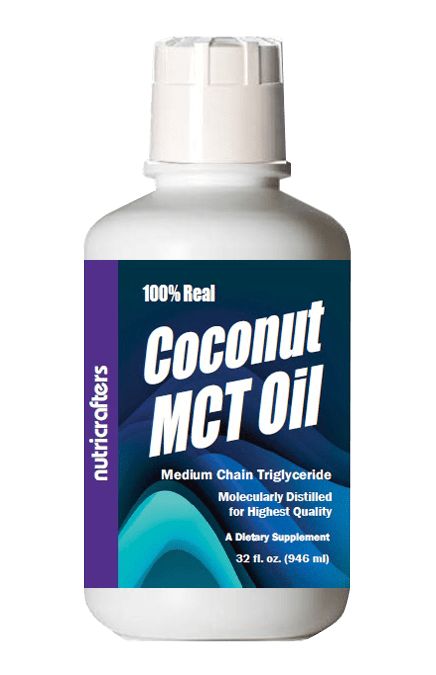
The ability for the body to run on either energy source is one that has allowed us to survive throughout the ages on many different food sources. The prevalent supply of carbohydrates available in the modern diet has almost eliminated the need for the ketone energy pathway. As with anything that is not used, this energy system has become weak and inefficient.
MCTs and Weight Management
Quite simply, we are talking about the body’s ability to burn fat to create energy. So as you might guess, consumption of MCT oils can benefit weight management. MCT oils not only avoid the traditional fat storage route, they also awaken this substitute energy route. The more active this system is, the more likely we will use body fat for energy production.
MCT’s and Cellular Function
With a typical carbohydrate dominant diet, we become more insulin resistant as we age. This is caused by an abundance of circulating insulin resulting from consumption of excess carbohydrates and/or lack of energy expenditure. The result of too much insulin is that the cells resist the normal intake of glucose and energy deficits result.
As cellular energy is disrupted, cellular death can result creating a domino effect that can interfere with normal body functions.
And there is good cause for concern. Insulin resistance is a growing health concern and predisposes many serious health problems. Between 1994 and 2002, a 23% growth rate brought the number to 6.8% of the total U.S. population. A recent study by the Centers for Disease Control and Prevention (CDC) reports as of 2015, 30.3 million Americans – 9.4 percent of the U.S. population – have diabetes. Another 84.1 million have prediabetes; that’s 26% of the total U.S. population.
Ketones to the Rescue
When an energy deficit results from a lack of cellular glucose due to insulin resistance, ketones can provide the energy needed for cellular survival. Ketones are primarily produced by the liver but can also be produce as needed from fats stored in close proximity to the energy requirement. While this process can avoid cellular death when circulating ketones are not available, left unchecked, it can create other problems as detailed below.
MCT’s and the Brain
As brain cells need energy in a state of insulin resistance, and circulating ketones are not available due to the common high carbohydrate diet, ketones will be produced from localized fat to supply the local energy requirement. As the brain is primarily comprised of fat, I hope you see the problem. In order to supply short-term energy requirements, certain fats within the brain will be used to create ketones to produce cellular energy. It is these fats that form the interworking of our brain and support overall brain function including memory and cognition.
The process of energy production to support cellular survival will preference short-term needs at the expense of long-term function. Dr. Bruce Ames first postulated this “triage” theory some 10 years ago. While his theory was focused in micronutrients, the idea is similar. If your body has a limited supply available, the priority will be focused on survival. In the case of the brain, autonomic function will be prioritized over higher brain function such as memory and cognition.
Reducing Addictive Carbohydrates
Those who have tried reducing or eliminating carbohydrates know that they have an addictive quality. The first week of carbohydrate avoidance can produce some strong cravings that are hard to overcome. Once ketones are produced these cravings subside. As C8 MCT is a ketone producing powerhouse, focusing on C8 MCT makes good sense.
A Quick Refresher
Most MCT oils consist primarily of C-8, C-10, and C-12 carbon lengths. While these are good general purpose oils that will not store as fat, the ketone potential varies. As I mentioned earlier, MCT oil is rapidly converted to energy producing ketones or excreted. Many people can’t tolerate the multiple teaspoons or tablespoons of traditional MCT oil required to stimulate meaningful amounts of ketones. Stomach upset and diarrhea are the likely result. C-8 MCT oil supports an abundance of ketones with a smaller dosage less likely to produce gastric side effects. With the lower dosage comes a lower calorie content and more effective stimulation of the fat to ketone energy cycle.
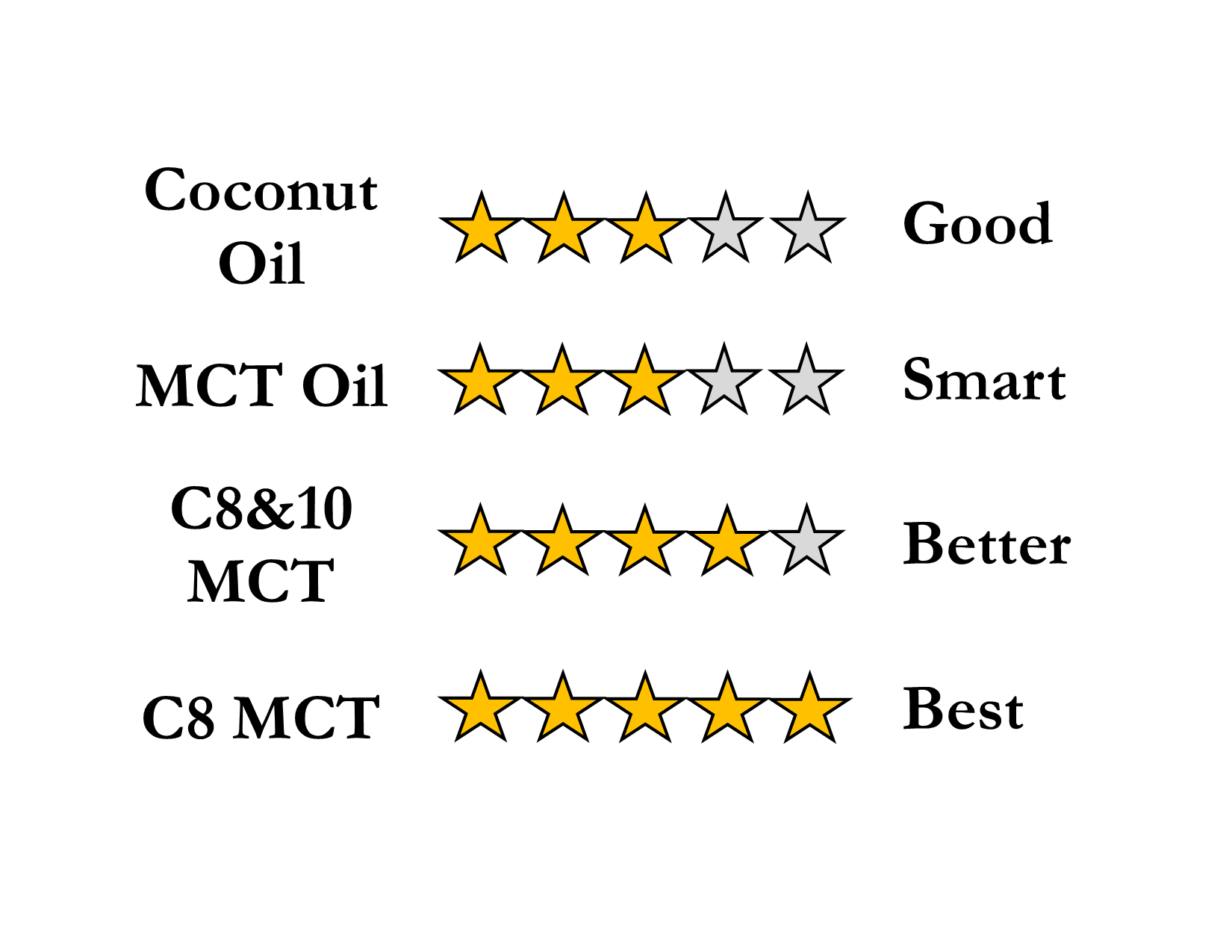
Product Usage:
Use MCT oils as a substitute for some of the usual oil in your diet such as salad oil. Start with 1 teaspoon and slowly increase the amount over several days as your body adjusts to burning fat for energy. Recommended use is 2 teaspoons 2-3 times per day.
Stir Easy MCT into drinks or spoon over foods to add a delicious creamy taste and to supplement your diet with high energy MCT’s. Start with 1 teaspoon, preferably with meals. Slowly increase the amount over several days as your body adjusts to burning fat for energy.
Caution:
Taking too much MCT oil can cause stomach upset and other digestive complaints. Do not use for high heat cooking or frying.


